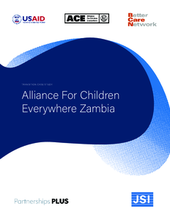Summary:
Alliance for Children Everywhere (ACE) Zambia is a US-funded organization that transitioned from providing residential care in Zambia to pioneering family-based care, including foster care, and supporting other residential care service providers to transition. With important links to the Zambian government, ACE Zambia has been a key actor in supporting the development of policies, programs and guidelines that are now utilized across the country.
Background:
ACE Zambia, formerly known as Christian Alliance for Children in Zambia (CACZ) is a faith-based and nongovernmental organization which was founded in 1998. The organization was formed under the vision of Alliance for Children Everywhere (ACE), a Christian non-profit organization based in the US, that sought to intervene on behalf of orphans and vulnerable children in crisis while providing family preservation and empowerment services.
The vision was brought to church leaders in Zambia by two Americans; Virginia Woods and Sandra Levinson in 1997. On their initial trip to Zambia, they engaged with several church leaders to form the initial alliance (CACZ). Since its inception, ACE has functioned as the resource mobilizing partner. Starting in 2001, the organization set up three residential care facilities for children. These facilities include: the House of Moses, which continues to provide care for infants and young children up to the age of two years; the Bill and Bette Bryant Home, which was set up for children between the ages of two and five years; and the House of Martha, which provided care for children aged six to fourteen years.
These centers were intended to provide temporary care for children while more permanent placements were being arranged. However, in June 2013, the House of Martha was closed due to organizational restructuring which resulted in the children in care being transferred to other childcare facilities by the Department of Social Welfare (DSW). Though ACE Zambia’s model has always intended to provide short-term residential care, this closure showed that children often remained in the facilities for longer periods of time. B

